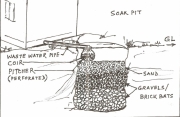/topics/rural-water
Rural Water
Droplets: Monthly e-Newsletter (July '10)
Posted on 14 Jul, 2010 10:11 AM
Highlights
- India: World Bank Aid of USD 372 million for Coastal Zone & Water Supply
- India: Centre Approves National Mission on Micro Irrigation
- Chennai: 45 New Machines to Clear Clogged Sewers
- Stockholm Water Award 2010: Phnom Penh Water Supply Authority is the Winner
- Grundfos: World’s Largest Pump Manufacturer by VDMA List
Clean drinking water using low-cost purification plants - A case study from the work of IFMR Trust and WaterHealth India in Andhra Pradesh
Posted on 08 Jun, 2010 11:49 PMThis field report describes the work of WaterHealth India (WHI), in organising safe drinking water using low-cost water purification units, in several villages of Andhra Pradesh. The work was taken up with financial support from IFMR Trust.
Vinjinampadu village in Guntur district, Andhra Pradesh, is one of the villages where WHI worked to establish the unit. The village had lacked potable water supply, because of which its people suffered from a range of water-borne diseases. The situation was similar in many of the other villages in which WHI initiated this work.

Women empowerment - Jalswarajya project launches 'Jalmitra' initiative in Maharashtra
Posted on 08 Jun, 2010 08:54 PMWomen ‘JALMITRA’ spanning awareness on O&M
Article by - Prabhakar Mishra, IEC Specialist, Jalswarajya Nagpur.
Inroduction
School water, sanitation and hygiene education - Paper by Water for People
Posted on 24 May, 2010 04:52 PM This document by Water for People, emphasises the importance of appropriate sanitation coverage in schools that is gender sensitive and culturally acceptable to the needs of both boys and girl students, rather than the exclusive focus on adequacy of facilities.
This document by Water for People, emphasises the importance of appropriate sanitation coverage in schools that is gender sensitive and culturally acceptable to the needs of both boys and girl students, rather than the exclusive focus on adequacy of facilities.
It discusses the case of schools in rural areas in West Bengal where it was found that although the coverage of sanitation facilities was reasonable, lack of adequate availability of water, lack of consideration to student differences in terms of age and gender in the construction of latrines and drinking water facilities, poor systems of maintainence and disposal of wastes made the sanitation facilities inappropriate for use.
Bihar needs to build 6,900 toilets a day to keep promise of total sanitation - A survey report by WaterAid (2009)
Posted on 01 May, 2010 04:51 PMThis brief report highlights the findings of an evaluation study conducted by WaterAid, India of the Total Sanitation Campaign (TSC), a national programme in India that ensures sanitation facilities in rural areas to eradicate open defecation. The study was conducted in the five states of Bihar, Chhattisgarh, Tripura, Karnataka and Haryana. This document highlights the findings of the evaluation study in the state of Bihar.
Financing on-site sanitation for the poor: A six country comparative review and analysis - A report by WSP (World Bank)
Posted on 20 Apr, 2010 06:58 PMThis report by the Water and Sanitation Programme (WSP) draws attention to the fact that a very high percentage (40%) of the population in the world does not have access to basic level of sanitation, which has serious health consequences and puts a considerable economic burden on the poor. The report explores the issue of what can be the most appropriate financing mechanisms to meet the sanitation needs of the poor.
Jal Chetna Yatra, S M Sehgal Foundation, Mewat, Haryana
Posted on 15 Mar, 2010 12:48 PMLocation : Villages of Mewat, Haryana
Organiser : S M Sehgal Foundation
The Vand women of Kachchh - A case study on drinking water management from the work of Samerth Trust in Kutch, Gujarat
Posted on 07 Mar, 2010 02:23 AMThis case study is about Samerth's efforts to achieve drinking water security, in participation with local village communities in Rapar, Kachchh (Gujarat). Arghyam has been collaborating with Samerth on this effort since 2007.
The Vand Women of Kachchh: Guest post by Keya Acharya
She gazes unflinchingly with direct eyes into the camera with a feminine mystique and physique that could, be gracing the front cover of a beauty magazine. Her red, mirror-worked blouse, in the traditional Kachchhi style worn by tribal women, is strapped at the back in stringed bows, greatly practical in the dry, wilting heat of that arid expanse of land in hinterland Gujarat called Kachchh. Her skirt is a colourful hue of printed green, and her ‘dupatta’ is a blazing red piece of cloth swept forward from her waist, partially covering her back, brought over her head and tucked back demurely into her waist again. Her name is Ammi.
Call for research proposals on rural drinking water and sanitation by DDWS, Government of India
Posted on 17 Feb, 2010 12:50 PMRajiv Gandhi National Drinking Water Mission, Department of Drinking Water Supply, Ministry of Rural Development, Government of India, funds research and development project proposals from established institutions and universities. The project must be related to rural drinking water and sanitation. Please see below the priority areas identified by the Department in respect to research and development in sanitation.
Empowerment through action:The story of Anna Lakshmi
Posted on 08 Jan, 2010 01:39 AMThis article shows how women are catalysts for advocating widespread improved sanitation and – at the same time – reap substantial benefits in a program promoted by an NGO called Gandhigram Trust. The empowerment of women and marginalized populations is a vital step in realizing gender equality – equal access, planning, and management – for water and sanitation.





